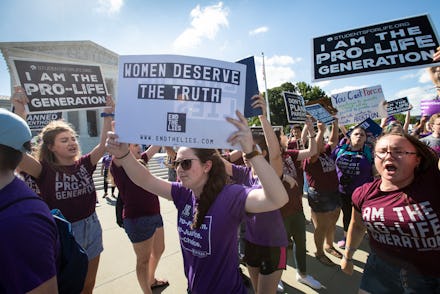Supreme Court rules in favor of anti-abortion “crisis pregnancy centers” in 5-4 ruling

Opponents of abortion rights received a Supreme Court win on Tuesday, as the court struck down a California law that imposed disclosure requirements on anti-abortion-access “crisis pregnancy centers” on the basis of free speech.
The court’s ruling in National Institute of Family and Life Advocates v. Becerra concerned California’s Reproductive Fact Act, which required that licensed and unlicensed pregnancy centers disclose certain information to patients. Licensed facilities are required to provide a notice informing patients that California has public programs providing “free or low-cost access” to family planning services, prenatal care and abortion. Unlicensed facilities are required to disclose that they are not licensed and have no licensed medical provider on staff.
The California law is directed toward regulating “crisis pregnancy centers,” which are faith-based facilities that provide certain pregnancy services while counseling people against abortion and contraception. With more than 3,000 facilities across the country, the facilities outnumber abortion clinics, and are often accused of employing misleading tactics. Facilities portray themselves as licensed medical facilities or abortion clinics, for instance, and often give women medically inaccurate information about contraception and abortion.
“Crisis pregnancy centers have been known to use extremely deceptive and coercive tactics to prevent women from having abortions,” Sung Yeon Choimorrow, executive director of the National Asian Pacific American Women’s Forum, said in a statement Tuesday. “What’s more, many set up shop in low-income and communities of color to take advantage of vulnerable women who may lack the knowledge, proximity or financial means of visiting real reproductive health clinics. That’s why their refusal to disclose that they are not licensed to provide medical services is misleading and hurts the women who need safe and accessible abortion care the most.”
In its 5-4 decision, the court ruled in favor of CPCs who had challenged the Fact Act, determining that California’s law regulating the facilities “unduly burdens protected speech.” The majority took issue with the fact that the law forced certain providers to post a very specific notice to patients.
“[The law] requires covered facilities to post California’s precise notice, no matter what the facilities say on site or in their advertisements,” the ruling noted. “And it covers a curiously narrow subset of speakers: those that primarily provide pregnancy-related services, but not those that provide, e.g., nonprescription birth control. Such speaker-based laws run the risk that ‘the state has left unburdened those speakers whose messages are in accord with its own views.’”
Though a lower court had upheld the California law by ruling that its notice requirements were regulating “professional speech,” Justice Clarence Thomas wrote in the court’s majority opinion that the Supreme Court “has not recognized ‘professional speech’ as a separate category of speech.”
“Speech is not unprotected merely because it is uttered by ‘professionals,’” Thomas emphasized.
Thomas did uphold the legality of certain kinds of regulation of speech, including laws requiring professionals “to disclose factual, noncontroversial information” and regulations of “professional conduct” that “incidentally [involve] speech.” The court upheld health and safety warnings, for instance, as well as “purely factual and uncontroversial disclosures about commercial products.”
The court also specifically upheld the legality of laws that require abortion providers to obtain “informed consent” before performing abortions, mandating them to tell patients about the “nature of the procedure, the health risks of the abortion and childbirth and the ‘probable gestational age of the unborn child.’”
California Attorney General Xavier Becerra decried the Supreme Court ruling Tuesday, calling the decision “unfortunate” in a statement.
“When it comes to making their health decisions, all California women — regardless of their economic background or Zip code — deserve access to critical and nonbiased information to make their own informed decisions,” Becerra said Tuesday in a statement.
Reproductive health advocates also spoke out against the ruling as being an attack on women’s rights.
“Today, the Supreme Court turned its back on women and condoned the deceptive tactics used by fake women’s health centers,” NARAL Pro-Choice America President Ilyse Hogue said in a statement.
Prior to the ruling, Hogue described the case as an “early test” of how the Court would rule on women’s issues in the Trump administration in an interview with the Huffington Post.
Even beyond its effects on reproductive health, however, Tuesday’s ruling could also be broadly influential when it comes to free speech. In his dissent, Justice Stephen Breyer noted that the majority’s broad ruling, which argued that laws concerning “content-based” speech are generally unconstitutional, “threatens to create serious problems.”
“Because much, perhaps most, human behavior takes place through speech and because much, perhaps most, law regulates that speech in terms of its content, the majority’s approach at the least threatens considerable litigation over the constitutional validity of much, perhaps most, government regulation,” Breyer wrote. “Virtually every disclosure law could be considered ‘content based,’ for virtually every disclosure law requires individuals ‘to speak a particular message.’”
Depending on how literally the ruling is interpreted, Breyer noted, it “could radically change prior law,” such as securities laws and consumer protection laws.
“Using the First Amendment to strike down economic and social laws that legislatures long would have thought themselves free to enact will, for the American public, obscure, not clarify, the true value of protecting freedom of speech,” Breyer wrote.